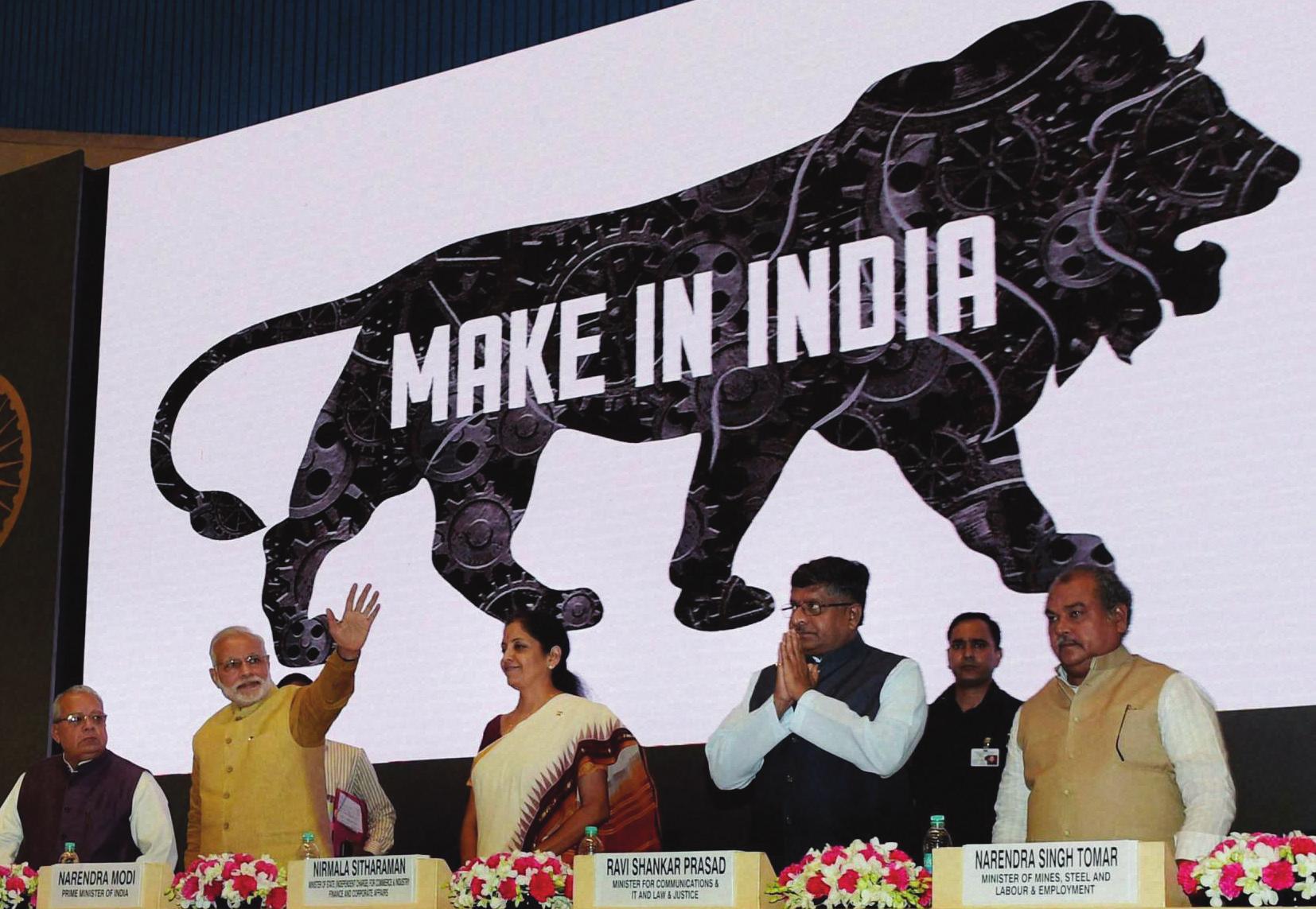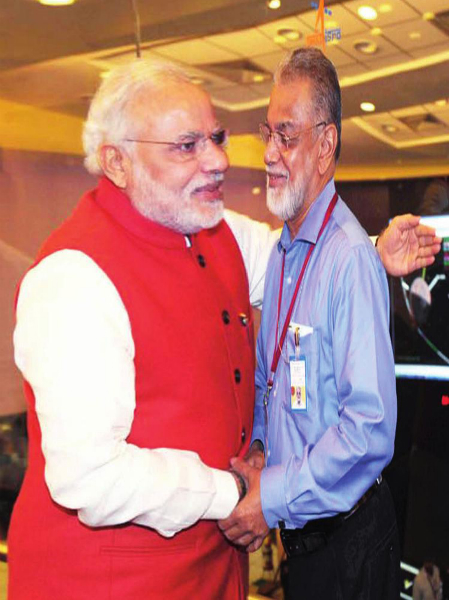Budding Managers - October 2014


Late last month, Prime Minister Narendra Modi kicked off his pet programme, Make In India, amid much fanfare. New Delhi’s Vigyan Bhavan, the venue of the launch, witnessed heads of top domestic and global companies nodding in approval as Mr Modi exhorted them to make India a manufacturing hub.
“You cannot attract investment just by an invitation. The most essential factor is trust. Let’s start with trust and the government will intervene only if it sees any deficiencies,” the prime minister added. He also unveiled the Make In India logo - a striding lion made of cogs, symbolising manufacturing - a portal to address queries of potential investors in 72 hours and identified 25 growth sectors to revive the manufacturing sector.
Business and industry captains listened in rapt attention as Mr Modi promised them a secure environment for their investments, a stable policy regime and easy and effective governance.
Manufacturing in doldrums A strong entrepreneurial culture, vast natural resources and a huge domestic market provide India the right ingredients to be a robust manufacturing hub. But contrary to the country’s inherent strengths and far removed from Mr Modi’s strong Make In India pitch, the manufacturing sector is in a bad shape. The little over Rs 15,00,000-crore sector contracted by 0.7 per cent in 2013-14 after expanding by a mere 1 per cent in 2012-13. Sadly, the sector remained subdued even during the country’s over 9 per cent economic growth period of 2005 to 2008, which was largely driven by the service sector.
The share of manufacturing in the country’s Gross Domestic Product (GDP) has stubbornly stuck around 15 per cent for almost three decades now. The number pales before China’s spectacular manufacturing strength, accounting for about 34 per cent of its GDP. In 1970, the Indian economy was larger than the Chinese economy. But today, China’s economy is thrice the size of India’s, and it is manufacturing that has made all the difference for the Asian giant.
Incidentally, it is the poor state of manufacturing that is responsible for jobless growth in India. The country created 50 lakh manufacturing jobs between 2004-05 and 2011-12, the latest available official figures. During the same period, some 3.3 crore people left farms, looking for betterpaid work - an encouraging sign of economic development. But unfortunately, a majority of them were absorbed into the low-productive, irregular and low-paying unorganised sector, with manufacturing in a depressed state.

The country’s big dream of becoming the world’s workshop is shattered by harsh realities. Infrastructure bottlenecks and logistical challenges pose a big hurdle to the Make In India initiative. Poor roads, crumbling rail freight infrastructure, severe shortage of power and a lack of air connectivity to some remote, yet robust, manufacturing hubs have held back the country’s ambitious manufacturing plan. Besides, governance deficit and a skewed taxation policy have made India a very tough place to do business.
But perhaps the biggest hurdles to the country’s manufacturing ambitions are its archaic labour laws, new and complicated land acquisition law and tortuous environmental clearance regime.
Governance deficit, leading to redtapism and inordinate delay in getting clearances, has cost the economy dearly. No wonder, the country finds itself in an unenviable position in successive global Ease of Doing Business rankings. India slipped three positions to the 134th spot in the latest Ease of Doing Business ranking released by the World Bank this year. The list of 189 countries was topped by Singapore, with the other BRIC (Brazil, Russia, India and China) nations - Russia at 92nd spot, China 96 and Brazil 116 - faring much better than India.
India is slotted in the third-lowest position in the same ranking, just above Bhutan and Afghanistan, within the South Asian region. The country cuts a sorry figure when it comes to its performance across sub indices of the Ease of Doing Business, such as starting a business, dealing with construction permits, getting electricity connection and the like. In the key parameter of starting a business, India finds itself in the embarrassingly low 179th position, with Russia, Brazil and China at the 88th, 123rd and 158th ranks respectively.
“You cannot attract investment just by an invitation. Let’s start with trust and the government will intervene only if it sees any deficiencies.”
Starting a new manufacturing venture in the country is quite a Herculean task. The new business will have to get more than 100 Central-, State- and local-level approvals ranging from registering a boiler or getting a fire department clearance to approval of construction activity and building
plan, getting a PAN, other tax identification numbers, clearances from pollution control board, chief inspector of factories and electricity board, among others. It typically takes six months to a year to clear all regulatory hurdles needed to build a new factory in the country.
The taxation policy too has taken its toll on the country’s manufacturing sector. Since liberalisation of the economy in 1991, the country’s Customs Duty has been lowered periodically. This has skewed the tax policy in favour of imports over local manufacturing. Besides, inconsistent tax policies have made foreign companies nervous about investment in India. The recent Union Budget did try to calm investors’ anxiety over tax policies. But these steps are far from enough to revive confidence among global players who look for a clearcut and stable tax policy. The long stalled Goods and Services Tax (GST) can actually go a long way in putting an end to the labyrinthine tax system that varies from State to State and compounds problems for investors.
Labour pain: The Indian labour market suffers from a curious mix of improbably stringent laws and totally lax implementation. It is highly distorted, thanks to a multiplicity of laws. Labour laws are a part of the Concurrent List, which means both the Central and State governments can legislate on labour. This has resulted in an overlapping jurisdiction with the industry and its employees at the mercy of nearly 200 Central and State labour laws.
The Industrial Disputes Act, 1947, is one such ancient law that has prevented India from becoming a manufacturing hub. One of its clauses states that all industrial units with over 100 employees will have to get the government’s permission to close down operations.
 According to the Act, industrial disputes have to be settled through a maze of six agencies, making it almost impossible for employers to lay off workers or shut down factories.
According to the Act, industrial disputes have to be settled through a maze of six agencies, making it almost impossible for employers to lay off workers or shut down factories.
Most industries tend to keep their labour force as small as possible and desist from expanding the size and scale of their operations to escape onerous legal requirements. Besides, they have been heavily relying on contract labour. Ironically, the Contract Labour (Regulation and Abolition) Act, 1970, which was initially designed to protect permanent employees, regulate widespread misuse of contract labour and uphold the rights of contract labourers, has done exactly the opposite of what it was enacted for.
The Act prohibits industries from engaging contract labourers in their core activities and stipulates minimum wages and basic working conditions for contract workers. But over the years, contradicting interpretations of the Act by successive governments and laxity on the part of authorities in implementing this law have led to widespread contractualisation of labour. With industries changing their contract labourers quite too often, they have been deprived of basic facilities and rightful compensation. This exploitation has often manifested in violent labour unrest, especially in automobile and auto component industries.
The contractual system of employment has come to occupy the core of Indian manufacturing today, accounting for about 58 per cent of the total organised sector. Such cumbersome labour laws have further shrunk the organised sector, which today makes up only 16 per cent of the total workforce of the country. Apart from stifling the manufacturing sector, these laws have destroyed the labour market and done precious little for workers’ welfare.
Not surprisingly, complex regulations have deeply hurt the Indian labour market, which has been ranked 99th by investment bank Morgan Stanley in labour market efficiency among 148 countries. China, Japan and the USA rank 34, 23 and 4 respectively in the same category. Meanwhile, labour productivity is low in India compared with that in China and other emerging markets. According to a McKinsey report, workers in India’s manufacturing sector are almost four to five times less productive than their counterparts in Thailand and China. Besides, shortage of skilled labour in the country, with only about 2 per cent of its total workforce
qualifying as skilled workers, impedes the country’s quest to emerge as a global manufacturing hub.

Green hurdles: As the government raises the stakes for manufacturing in the country, it will have to work hard on rationalising the existing environmental clearance process. About 253 major projects worth over Rs 12,00,000 crore are stuck in the country owing to a lack of green signal from the Ministry of Environment and Forests (MoEF). According to official data, about 44 per cent of the stalled projects with investment over Rs 1,000 crore are held up for want of environment, forest and wildlife clearances from the MoEF.
The country’s green nod process is a mess, unable to strike a balance between demands of growth and the need to protect the environment. According to the Environment (Protection) Act, 1986, about 39 projects are mandated to get environmental clearance (wildlife and forest clearances too if they are situated in or near a forest) to start operation. But this long-drawn process with its utter ar-bitrariness has slowed down approvals and clogged huge investments. The environmental clearance process is neither independent and nor based on science as it may appear. Besides, political considerations do often play a role in making or marring a project in the garb of green nod.
The arbitrariness is borne out by the fact that the Environment Impact Assessment (EIA) notification, the vital document that guides the environmental approval process, has undergone changes more than 100 times in less than seven years of coming into force. As a result, contrary interpretations of the notification every few years have further muddled the process and delayed clearances. Moreover, the Expert Appraisal Committees (EACs), which assess the EIAs and recommend projects, have become a parking lot for retired bureaucrats.

The US and other developed countries have simplified the environmental approval process with clear-cut norms and vested authority in an independent expert body for appraising and approving projects. The mess in environmental clearance in India is a result of arbitrary procedures, ambiguous norms and concentration of policy-making and regulatory powers with the MoEF.
In January this year, the Supreme Court pulled up the MoEF for shoddy environmental clearance process and asked it to constitute an independent regulator to approve projects. However, there seems to be no progress on this front so far.
Land woes: Meanwhile, the new land acquisition law - The Right to Fair Compensation and Transparency in Land Acquisition, Rehabilitation and Resettlement Act, 2013 - has complicated matters for major projects looking to acquire land. The new Act, which replaced the Land Acquisition Act, 1894, enacted during the British rule, was framed to rid the flaws associated with the previous legislation, such as forced land acquisition.
The new Act has got its intentions right. It mandates a consent clause for the State to go ahead with land acquisition, requiring consent of 70 and 80 per cent of landowners for public-private partnership (PPP) and private projects respectively. It recommends payment of compensation for land losers up to four times the market value in rural areas and twice the market value in urban areas. The tragedy of the previous law was compensation based on circle rates, which are notorious for being outdated and not even remotely indicative of the actual rates prevailing in the area. The new law also deals with various forms of compensation, such as land for land, housing, employment and annuities.
This is also the first law that links land acquisition and the accompanying obligations for resettlement and rehabilitation. The Act directs States to impose limits on the area of agricultural land that can be acquired. It also stipulates a social impact assessment of every project that must be completed within six months.
Despite all its noble objectives, the new Act seems to have gone over boarding correcting the anomalies of the previous law. Industrialists and other project promoters are worried that the consent clause, huge compensation and social impact assessment for all projects, irrespective of the size, will lead to a further delay in projects going on stream, ultimately push up production cost and badly hit the country’s ambitious manufacturing growth plans. Many State revenue ministers, in their recent meeting with Rural Development Minister Nitin Gadkari, have urged for scrapping the consent clause for PPP projects, slashing it to 50 per cent for private projects and doing away with the mandatory social impact assess-ment clause for small projects.
Beyond rhetoric: Going by the sheer size and scale of the Make In India campaign, Mr Modi has certainly succeeded in packaging the manufacturing endeavour well. But the task ahead of reviving the sector is quite challenging. The government has made a good beginning in addressing the ticklish issues.
The first steps of overhauling the outdated labour laws have begun in right earnest. The government was quick to pluck the low-hanging fruits by getting amendments to the Apprentices Act, 1961, the Factories Act, 1948, and the Labour Laws (Exemption from Furnishing Returns and Maintaining Registers by Certain Establishments) Act, 1988, passed by the Parliament in its monsoon session. All these measures clearly enhance the welfare of workers and make it easier for industries to operate.
The prime minister has also unfurled the Skill India Mission to transform Indian workers into a highly skilled labour force.
Under the National Skill Development Corporation, the government is giving a big push to promote skill development through the PPP mode. Besides, a separate Skill Development Ministry in the Modi government speaks volumes about the government’s commitment in this direction.
Yet there is a long way to go for India to become a manufacturing hub. The contentious labour laws, like the Industrial Disputes Act and the Contract Labour Act, need to be over-hauled. Besides, there is an urgent need to streamline the environmental clearance regime and rationalise the new land acquisition Act. The prime minister has set an ambitious target of improving the country’s Ease of Doing Business ranking to 50 from the current 134. This will require simplifying a number of long-winding procedures for starting ventures.
Meanwhile, experts estimate that the country will have to create nearly 10 crore jobs in the next decade - 1 crore every year - to absorb the additional manpower entering the labour market. According to official estimates, about 20 per cent of Indian youth is currently unemployed. Add to this, the additional workforce each year, and it will lead to a huge pool of unemployed or underemployed human resource.
A robust manufacturing sector can easily absorb this manpower. Besides, it can lead to a virtuous cycle of skilling, employing and empowering a large section of the country’s population and also trigger broad-based economic growth. However, the country’s service sector-led model, which is capital-rather than labour intensive, has resulted in lopsided growth. It has provided ample job opportunities for skilled employees but left out a vast pool of unskilled labourers to fend for themselves in the unorganised sector.
The Make In India campaign makes a welcome attempt to revitalise manufacturing and widen economic growth. It is essentially an attractively packaged extension of the National Manufacturing Policy of 2011. The policy aims at enhancing the share of manufacturing in GDP to 25 per cent from the current 15 per cent and creating 10 crore jobs in the sector by 2025. It envisions setting up of national investment and manufacturing zones (NIMZs) for building the country’s manufacturing muscle.
In fact, long before the NIMZs, there were special economic zones (SEZs), which were planned as vibrant manufacturing enclaves that doubled up as export hubs. However, SEZs today are in a moribund state, thanks to inherent policy issues and the same challenges that have affected the manufacturing sector. The muchtouted NIMZs too have been impacted by the same issues and failed to take off. The Modi government should go beyond catchy slogans and impressive targets and start addressing the real issues. Only then can Make In India transform into Made In India.
BUDDING MANAGERS
OCTOBER 2014 ISSUE
Can a businessman think beyond minting profit? Can a multinational firm compromise on a handsome turnover? They can’t and they shouldn’t – many argue. But with the spur in awareness about corporate social responsibility has brought about a wind of change in among the revenue minded corporation and commerce. Contrary to the prior notion when businesses were often considered as a one way street, the concept of giving back to society is the today’s new corporate norm.
A crisp definition of CSR would be – ‘a company or an enterprise that indulges in an activity that is beneficial for the community is said have imbibed the quality’/ From mammoth multinational firms to humble start-ups, business folks from ever spectrum are realizing the importance of CSR. In a bid to be socially conscious, the corporate culture in the global arena has accepted this concept. Technically CSR is considered to be philanthropic act. Business connoisseurs believe that an enterprise should be built on the foundation of trust and foresight. Though there are various stages and levels of CSR, many companies stick to the minimal parameter and therefore aren’t actual social contributors. It is not only the society that gets benefitted in the bargain but the company initiating the goodwill gets to enjoy good reputation and loyal recognition from their respective consumers. Well executed CSR drive can attract prospective investors and high caliper manpower. Indulging in CSR activities lets the company establish a strong connection and stronghold among the local community. Fostering long term relationships and participation in socio-economic development becomes easier as CSR reinforces the tie between the commercial brand and its local community.

While for many, CSR is a step too far. The initiative requires sacrificing profits to an extent and needs the company to comply by environment friendly terms and conditions. It cannot be denied that most of this pro-society activity is good for the masses but more often it can mean jeopardizing on big chunks of business and returns. Balance and the right cause is the key. Companies that get it right can only give back to the society but can benefit from it as well. CSR often known as sustainability by moguls and business magnets are can re-invent the image of a business in the market. Wise move in the CSR direction can push certain valuable business processes into the organization. Five reasons why businesses and professionals should embrace CSR are as follows.
Let’s get innovative:
Using the whole concept of corporate social responsibility as a means to forward reach into the market can prove to be one the wisest decision made by an organization. For example: the extensive education drive and the CSR initiative called Shiksha by ITC (Indian Tobacco Corporation) proved to be an immensely successful campaign for the organization.
The idea should be innovate and to come up with unique yet sustainable campaign plan or product. Hand wash products or detergents that consume less water are classic examples. In the context of CSR, a smart innovation can be hugely beneficial for the company as well as for the society. Therefore, the concept of sustainability should be given its due credit, as without it, companies wouldn’t have been able to come up with such people-friendly or pro-envirionment product or concepts.

Let’s cut cost
Savings and cost cutting is possibility the easiest phases of imbibing corporate social responsibility. Anything initiative or activity that is environment friendly will require the fi rm or the organization to go easy on the consumption of energy. This move in turn proves to be cost effective as it would mean usage of less raw material as well as energy. Along with sending out a positive message such activity as also adds up on savings for the firm.

Energy monitoring meters, usage of solar panels and lesser consumption of natural resources not only saves the environment but also helps the company in building a positive and proactive image.
Let’s think long term
Many proficient entrepreneurs prefer the term sustainability over corporate social responsibility. Reason being, that in the long run, CSR practices ensure that the company remains sustainable in the market. CSR is possibility the only business plan that promises growth for the company as well for the community. A long term interest and a secure place in the market can be possible only by the means of be socially proactive. If a consumer can relate to a business or brand apart from services or product they pay for, then they tend to stay loyal and relate to the brand in a deeper manner. The seeds of sustainability might not reap immediately but tend to have long term result. It prepares a company to think about its position in the market ten years from now rather than ponder about the net fiscal year and the immediate future.

Let’s talk it out
Rather than talking about the product directly, if the company first talks about a human interest issue that the customer can relate to easily the brand gains more recognition. Dwelling on winning your target audience by taking up social causes that matter to them creates a bond of confidence and reliance like none other. Experts opine that the best way to talk about your product is to start by talking about something ‘good’ and ‘easy’. This mode of communication and relationship building is an underused tool when it comes to bridging business to business interaction. At the grass root level, various international companies are indulging in reaching out to their own employees through the means of sustainability tactics. Engaging workforce into human interest programs help in strengthening the personal bond between a company and its employee at large. Also, the best way to make a brand stand out and get noticed among heaps of competition in the market is through a solid corporate social responsibility plan.
BUDDING MANAGERS
OCTOBER 2014 ISSUE
Digital dreams and the parallel universe of virtual space have merged into entrepreneurial reality as many amateurs starting taking to the online medium to launch their start-up this year. Starting a digital venture can be a prelude to your original grand plan of a mega start-up. Online businesses are easy and uncomplicated. It gives you the experience of running a business without the heavy laden risk factor. The only investment that would be required would be a solid idea, patience, persistence and consistency. Following the below five models will initiate a newbie to the world of online businesses and its endless possibility.
Blogging
If you are looking for a quick and hassle free business launch then the World Wide Web and Internet is the place to be. The hotspot and the most happening avenue with more pros than cons is the digital space. The medium is not only safe and easy on the pocket but also extremely reliable and genuine. With one the farthest reach, only the Internet has the power to penetrate deep into the market and reach your consumer’s doorsteps and house without much of an effort. The best way to start is to blog. There are various free blogging portals and platform like www. blogger.com and WordPress that can be used to begin with. In order to maximize the output and reach, the blog should be strong in two facets – first the content and then in its consistency. Once the blog picks up popularity and gathers enough audience, it can be turned into a revenue yielding medium. Starting with advertising wanting to display their product on your blog page to allowing related services and consultancy voice their sales pitch. Welcoming other authors and writers to publish their original content onto you blog can also be a good idea.

Once the blog is up and running, the blogger needs to shift base and learn and master SEO (Search Engine Optimization) which will help you make money off your online content.
Google Ad sense
Very similar to the concept of blogging, it is by far the most innovative business idea created by Google for an amateur. It is easy, affordable and completely accounted for. The concept of Google Ad sense revolves around the idea that the owner of the website can make money through their online site by strategically placing advertisements in their content. All the ads and the payment procedures and accounts are handled by Google itself. The job of the owner of the website is to create popular content which would attract lot of audience and hits. Quality content is essential. The logic is simple – the more quality content you generate, the more online traffic the website will attract. The more popular the website gets more money can generated through it. Making money overnight or getting popular through one stream of good content is not sufficient when it comes to Google Ad sense. Consistency is key.
Freelancing
If you have the gift of the gap and yearn for the fl exibility to work on your own terms then freelancing is a tailor-made option for you. For those who possess the skill set to service based firms, freelancing can make you money no matter which corner of the world you are at. It give you the leverage to work from home, while on a holiday or technically anyplace with a decent internet connection. Freelancing business can be beneficial if you can write, create computer programs or are a graphic designer.
Instead of being affliated with a company, freelancers can offer their services to various businesses online. Website like oDeak and eLance will help you get started. Their portals have assignment posts that you can pick from and subsequently offer to work. Once you familiarize yourself and get noticed, clients and online businesses will approach you without having to post for job requests. For a country like India, there are plenty of clients from the western world who would be willing to pay decent rates in exchange for the online assignment.
Information Marketing
This is one of the most recent trends in the world of online businesses. With very promising prospectus, information marketing is growing in demand. Though it’s a fairly new concept when compared to freelancing, blogging and Google Ad sense, it has more scope and cover larger audience with diverse opportunities. While the other three options was restricted to people with only a particular set of skills like content generation, graphic designing and the like, information marketing let’s you take you talent and tutor online. The idea is to provide quality information and genuine tutorial on various topics. Websites like Kindle, Amazon and Create Space can be used to launch and publish the gathered information in the form of e-book, audio only or audiovisual courses on the online medium. This platform helps the publisher to utilize their talent and transfer their knowledge onto the digital platform. Identifying the right market space, and providing what they need at the right time and in the right manner is the key to be successful with you information marketing venture.

Affliliate marketing
This is easiest and the most un-involved mode of making money only. You can rack in the money just by promoting products of other companies at the digital space in exchange for a fi xed percentile of the sale price. It is an easy, crisp and clear deal to begin with. Affiliate marketing can be clubbed with one or all the above options of online business models. This is the only model that requires absolutely zero investment in terms of money or idea. Neither does this option require any pre-planning or a set of skills. An individual who wants to try their hand at online business can get online and start promoting and making money almost instantly. However, the catch is, unlike other models big big bucks might be a little too difficult in terms of affliliate marketing. You would be able to sell a product only if the customer stumbles upon your website and given the thick competition in the online marketplace, the chances of getting constant hits are slim.
BUDDING MANAGERS
OCTOBER 2014 ISSUE
Tapping one’s potential on time and nursing it with the right nature of education is like finding the missing piece to a mind-boggling jigsaw puzzle. While deciding to opt for a post graduation degree in business can be a leap ahead in itself, it still might not suffice if you fail at picking the right specialization. Picking the specialization can either make or break your corporate career. There is a wide assortment of options available today. Conventionally, when the idea of business studies was conceived only a handful of specialization was offered. But, the evolution of business styling and the revolution in the perception of corporate conundrums has refurbished the old-school thought of business education. the idea is to nurse and nurture the skill set of an aspirants without pressurizing them with heaps of study material that might not be relevant to their aspirations.
Making the right pick
The decision can be as crucial as picking to do the two-entire stint at the B-school itself. Having said that, there are few parameters that can help an aspirant to gauge their potential and pick the right specialization. Ideally, the first step is to identity you sore interest and skill sets. Knowing what you are good at and which talent you want to hone will get you more than half way closer to your goal. Identifying your talent can be taxing initiative, they key is to start early. Pay close attention subjects that interests you and the lesson can you score well at while at pursuing your bachelor’s degree. Or if you yearn to work alone and are good at leading then entrepreneurship is your calling. Next phase is to tap into your career goals. Decide what and how and in what field you would want to work. If you like to travel and convince people – then marketing should be your choice of specialization.

Similarly, if you are a people’s person and like to manage manpower and resolve behavioral issue within a group than Human resource should be your pick. Apart from these aspects also take a look at the specializations and courses on offer at your preferred B-school. If becoming a business specialist is your aim, then stick to a two-year course. Though, there are colleges now that offer a fasttrack one-year MBA course, experts however opine that such short span will not be sufficient for quality business educations when clubbed with a specialization. The following are the choices available to you:
Marketing
The stream of is one of the first courses to be offered with the maiden set MBA specializations. Fit for those who have a zeal for traveling, selling, convincing, communicating and people watching. Marketing is one of most rewarding and in-demand specialization of the lot. Being a dynamic and competitive genre that it is, marketing helps in understanding marketing strategies, consumer behavior, advertising tactics and new product development. A graduation degree in any stream of commerce will be beneficial. Within the global market witnessing new-age changes and advancement like social media avenues and online trading the way marketing is perceived has been revoltuionised. Door to door sales pitch or boardroom marketing is no more the norm. Marketing tools has become more sophisticated to gain a competitive edge. Marketing determines the phase and pace of a business. The skill sets required to pick this specialization is the knack to communicate, the ability to plan, prepare and execute, the knack to mobilize resources, strong interpersonal skills and solid analytical skills.

Finance
It is all about the numbers and figures. If you are good with doing the math then this specializations is probably your best bet. The one’s good at finance end up holding very prominent positions in corporate organizations. Finance is the oldest of all specializations had colleges today have to offer along with the post graduation degree in business. The course includes excessive insight into areas like budgeting, management of funds and capital, costing, regulation of cash fl ow, revenue management, investment, securities, international finance and the likes. Graduation in statistics, mathematics, engineering and commerce might be more feasible. In the past decade the market has gone through a great deal of financial upheaval, studying this changes an predicting the future and learning lessons from the aftermath is what this
specialization deals with. For those who want to make a career in finance, the industries that offer jobs are banking, trading firms and finance companies. This specialization in particular has lot of interface and verticals that it deals with such as auditing, company and trade laws, accounting and more. If you want those who want to optimize your chance of making it big in finance the preferred option would be to club your MBA degree along Chartered Accountancy.

Human Resources
This one’s for the talkers and the doers. This skill is what makes them the movers and shakers of any given industries irrespective of the genre. One of the most popular streams of all HR requires the individual to have a dynamic personality, good communication skills, excellent interpersonal skills, a confident outlook yet an approachable persona and a reliable conduct. The entire gamut that revolves around manpower and people is related to human resource personnel. Complying with the aim of an organization, an HR is responsible for recruiting; maintain work decorum, staffing, settling grievances, people management, employee retention and host of similar activities. Facing unexpected and tricky situation is an everyday tussle for HR personnel. Being creative, calm and composed is an essential personality trait. Policy making, union negotiation and sensitive employee issues are few more tasks. Keeping up with the evolving market and needs of the people would extensively help an HR aspirant.
International Business
Going global in the literal sense of the word, a specialization in International Business gives an insight into the working of international market and corporations. If the aim of the MBA aspirant is to make it big in a multinational company r to work overseas then this specialization is tailor made for you. The functionalities of international business include understanding global market, assisting in international transaction, sourcing foreign clients, business expansion etc.
This is the only specialization that includes tidbits from every other specialization – from finance to marketing and human resources to operations. With globalization in place, many organizations are now on a hunt and hire spree, individual with an international outlook and understanding is exactly what they need. Bachelor’s degree in any subject would suffice to pursue international business. This specialization is going to prep you to take on any business challenge in the global arena and help you take your local business to an international platform.
Information Technology
IT is more of an engineer’s calling they say, but not anymore. With the world of communication and information technology evolving like never before, managers and leader with an insight and understanding of the IT world are required to run a business successfully. From hardware to software issues, an IT manager will be trained in both technical as well non-technical sphere of commuting and its workings. Specialization in IT, especially during an MBA teaches the student to plan, design, execute, select, implement, use and administer the converging world of information and communication technology. The role of an IT-MBA candidate in an organization will be in the business team where the individual will be involved in clubbing hardware and software issues with business problems and amicably taking the business forward. Interest in computing and new-age communication technologies is necessary. Business analysis, telecommunication, enterprise management, database development, is one of the many aspects that will be extensively covered. Holding professional positions these IT folks will be part of network administration, application development and web applications.
This field require the zeal to continuously improve and learn as IT will never cease to evolve hence making it a lifelong learning process. Bachelor’s in any field would suffice.
Operations
Specialization in operations touches and includes almost every facet of business and of an organization. An ideal candidate for operations should have the gut to be calm in tricky situation, ability to negotiate, integrity, loyalty towards the company and good co-ordination skills clubbed with sound technical knowledge. Operations is considered to be the skeleton of any organization, a foundation of sorts. In a conventional set-up, this job profile will include responsibility like vendor handling, manpower sourcing and resourcing, participation in supply chain management, inventory, vendor and publishing management, enterprise resource planning and anything and everything to do with cost optimization initiatives. The career graph would start with fewer responsibilities such as handling parts of a plant and vendors and will eventually swell into handling broader areas such as handling the entire manufacturing unit or a factory. Top management post is heavily laden with risk and responsibility that one has to face almost every day. On the flipside, experts have opined that given the changing trend in the market, not many multinational companies are too keen on investing heavily on operations staff like before. With sectors like BPR (Business Process Re-engineering), ERP (Enterprise Resource Planning) and supply chain management emerging in the market the scope for operations personnel is dwindling. Bachelor’s degree in any discipline will suffice.

Media and telecommunication
Often exclusive off each, media and telecommunication is one of the most promising and fast growing area of specialization. This one is for those who want to build a career in media, advertising, public relations, journalism and media marketing. The skill set required for this genre is a lot like the folks who want to make it big in Human Resources. Solid communication skills, networking skills, interpersonal skills and quick wit are the traits required. The art of media management and media related business expertise is what a student learns at their B-school if they opt for specialization in media. Media is considered to be an extremely fl amboyant, fast-paced and entertaining arena to work in.
Telecommunication and media is one of the latest genres to be added in the spectrums of specialization available. As MBA degrees are not as common in this industry as in the marketing, finance and HR sphere, individuals who’ve earned this specialization tend to get an edge over the rest for advancing from mid to upper level of management within the media industry. Telecommunication, fairly an elder genre when compared to media has grown leaps and bounds in the last couple of decades. Being one of the fastest growing sectors, the essentials are value added services, digital economy, usage of electronic mail, WAP, cellular devices and the likes.
Consulting
In most of the consultancies, whether in India or abroad, only an MBA graduate is considered for management jobs exclusively. If the aim is to reach the top of the hierarchy in a consultancy firm, it is impossible to do so with an MBA degree. A career in international management consultancy now requires the candidate to possess a management degree compulsorily. Consulting is the new rising genre that is set to revolutionize the job market. According to a recent survey conducted in the United States of America, consultancy has become the highest paid vocation for a fresh MBA graduate. If the numbers projected by this survey is anything to go by then, in the next five years consultancy will become the number most-preferred MBA specialization. In order to excel in this field, one needs to be familiar and equipped with the latest cutting edge innovations and management. The pedagogy is to quip the students with practical knowledge with the aid of case studies, industry visits and live problem solving techniques.
The quality required from an aspirant is a sense of ownership, clear communication skills, authoritative approach, confident personality and the capacity to run and influence a team. In most B-school, this specialization covers decision modeling, honing communication skills, learning about various management tools, change management, corporate recovery, practice development and a host of other relevant areas.
Few new entrants...
Apart from the above elaborate mentions there are few brand new genres of that has join this bandwagon of MBA specializations. Health care and pharmaceuticals, entrepreneurship, corporate social responsibility, innovation, leadership, supply chain management and a host of such new-age business related aspect has been included in the curriculum. Though not available at every B-school nationally or internationally, these specializations are slowly picking up popularity among newbie. Extensive homework and self-scrutiny is required before opting for a specialization. For the latest additions pick a good grade B-school that has these specializations on offer.
BUDDING MANAGERS
OCTOBER 2014 ISSUE
Being lost and direction less is an obvious trait of a B-school entrant. But, with each semester and session, a rough knowledge of relatable area of expertise starts to take shape. With MBA being one of the most prominent and sought after post graduation degree, recruiters and business connoisseurs have charted the best job avenues for the B-school pass out. This list of denotes all the popular occupation or prospective fields of 2014 that a MBA student should look at while hunting for a job. With the sheen of MBA degree beaming brighter with every passing year, an MBA graduate is sure is to find their right holding without too much of a wrestle. Whether it be an entry level job, a direct jump to the top or an own venture, with such plethora of job options, a management newbie will soon be marking their first big corporate impression. With the interview-calls pouring in and the job market gearing for its new entrants here are the sectors that an amateur should be looking at:
Become a marketer
Sales and marketing is probably the most sought after and popular field of specialisation in MBA. Jobs related to this sector are known to be fast-paced, challenging as well as rewarding all in one. For those who have the talent to sell, this field is booming and will be the next big sector of occupation in the following financial years to come. While recruiting for this particular sector of management, the hiring bigwigs look for that spunk factor in their candidates. A marketing professional is the voice and face of the business. Responsible to boost and maximize the company’s customer base, sales outcomes, profitability and market reach, a marketing professional weighs in the market trend, identifies opportunities and designs strategies and campaigns.

With top salaries and incentives going to marketing and sales professionals a 12 per cent of employment growth projected in this sector.
Become a banker
The common notion that banking is a stream for the oldies and maths buffs has become a thing of the past. This year witnessed a boom in this sector, as various newbies opting for the banking sector to start their career. MNCs and financial firms also recruiter flocks of fresh-out-of-B-school graduates for prominent post in their banking sector. The most traditional option from the ever-selling list of job avenues for an MBA graduate, the banking sector has been a hot favourite ever since the conception of the degree. Raising capital, initiating acquisitions and mergers, strategic planning and overlooking financial transactions are the roles that fall under the job description of an investment banker. For those good with numbers and a sound specialisation in finance can apply for this sector. With an impressive 12 percent increase in banking job estimated over the next ten years, Banking can sure be a prime priority for a fresher looking for a handsome salary and promising bonuses.
Become a techie
Computer and the roles related to them are no more reserved for the engineering folks and computer graduates. MBA students with specialisation in this field are todays considered as tough contenders. Any role related to computers - software and hardware, internet and intranet, installation and up gradation, network development and management would fall under this class of Job Avenue for newcomers.
 Also involved in the security and business networking of the company, this profile demands an MBA graduate with specialisation in Information Systems. Tagged as one of the fastest growing sectors, aspirants will be able to branch into system design establishments, healthcare organisations, data processing, software publishing firms, scientific and technical consulting firms. A 17 percent hike in such jobs available in the market, this sector promises to pay a handsome package to right candidate even at the entry level.
Also involved in the security and business networking of the company, this profile demands an MBA graduate with specialisation in Information Systems. Tagged as one of the fastest growing sectors, aspirants will be able to branch into system design establishments, healthcare organisations, data processing, software publishing firms, scientific and technical consulting firms. A 17 percent hike in such jobs available in the market, this sector promises to pay a handsome package to right candidate even at the entry level.
Become an entrepreneur
Half of the populace that joins a B-school does so with the intention of becoming of an entrepreneur some day. The prime focus of over half the students pursuing this degree either secretly or openly wants to become their own boss and start a venture. Independence and thrill are terms associated with this selection. Being the owner of your own enterprise is a choice that many MBA freshers are making today. Putting your financial resources at stake and taking personal risk, this is the only avenue that allows an individual to thoroughly apply their theoretical knowledge acquired at the b-school into a practical context. Though many remain apprehensive about this risky option, recent surveys have noted .21 percent increase in fresh MBA graduates renouncing their offered jobs in multinational companies to start their own firms.
Become a digital doer
Amidst listing out various occupation that has become popular in the past year, there is an job avenue that requires a special mention as it has surprised the business world. Opening up a world of opportunities for all the fresh-out-of high-end B-schools students as well as the young internet geeks, E-commerce has overthrown popular job avenues like management consultancy, Information technology, software and the likes to score the second slot. The first in this list being the Fast Moving Consumer Goods (FMCG) sector, E- commerce has become the latest rage following the boom in the online shopping sector nationally and internationally.
 According to the astounding revelation by a study carried out by eMarketer, E-commerce sector a.k.a the internet industry, has emerged as the fastest growing sector to cross the 1 trillion US Dollar mark. With most of the growth in this zone expected to be scored from the Asia- pacific region, India is today in the epicentre of this boom. Kudos to the shifting of shopping preferences among consumers from the physical medium to an online platform, the pace of this upward trajectory is only expected to soar higher with the worldwide e-commerce expected to swell over 20%, crossing the 1.5 trillion Dollar mark in the coming years.
According to the astounding revelation by a study carried out by eMarketer, E-commerce sector a.k.a the internet industry, has emerged as the fastest growing sector to cross the 1 trillion US Dollar mark. With most of the growth in this zone expected to be scored from the Asia- pacific region, India is today in the epicentre of this boom. Kudos to the shifting of shopping preferences among consumers from the physical medium to an online platform, the pace of this upward trajectory is only expected to soar higher with the worldwide e-commerce expected to swell over 20%, crossing the 1.5 trillion Dollar mark in the coming years.
Become a consultant
Being a business analyst or a corporate consultant is a fancy and highest paid post in an organisation. Being a white collared job through and through, this sector is fairly recent and is fiercely challenging. This field has immense scope for growth and learning. Steering a corporation in the right direction in order to maintain relevance and competence in the global market is what a management consultant does best. Specifically trained according to the functioning and format of a firm these folks aid in controlling cost, increasing productivity, enhancing worker efficiency and maximising income. A particular specialisation of MBA is not required, but experience is definitely an added advantage score this title. Acting advisors to the Chief Financial Officers, Chief Operations Officer and similar top-rank holders an analyst earns fairly enough. 24 per cent employment growth is expected in this sector. An option to freelance as a management consultant is a major bonus as well.
BUDDING MANAGERS
OCTOBER 2014 ISSUE
For those passionate about education and the generic betterment of the society, good work comes naturally. While starting and successfully running a prominent B-school is a commendable feat in itself, for the patrons of SKIMT, it is just a beginning. The ultimate aim is to churn out world-class corporate champions. Backed by top-notch technology, brilliant staff and an impressive infrastructure, SKIMT has already started bringing out the best in its students by providing the best of business education to these future corporate moguls.
Your B-school has accomplished various impressive benchmarks in terms of business education; please tell us a little more about you and your college.
Sri Kaliswari Trust formed by Sri Kaliswari group of companies, which runs leading industries in the area of fireworks, matches, pyrotechnics and metal powder has established SKIMT, a standalone B school in the year 2008, in Sivakasi, an industrial hub in Tamil Nadu.
Our institute is approved by AICTE, New Delhi. We offer a two year full time MBA programme as well as a one year M.Phil in Management. These courses are affiliated to Madurai Kamaraj University, Madurai. SKIMT is housed in 2.54 acre green campus located at A.Meenakshipuram village, Anaikuttam, on Sivakasi – Virudhunagar main road.
According to you, how is studying a Management course more beneficial for an aspiring entrepreneur / manager than studying as ordinary Maters in commerce?
Management course is application oriented. It emphasizes on practice also rather than on theory alone, as in the case of master in commerce. Hence, students pursuing management course are given relevant industrial exposure.
MBA is fast becoming a hot favorite among youngsters in the country. Unlike before, when professional degrees such as engineering and medical were given preference. What’s your take on this?
MBA has attracted the attention of not only arts and science graduates, but also graduates of Engineering and Medicine, because, they are able to learn not only concepts of management but also its innumerable practical application in their chosen field.
How can MBA help both a corporate job-seeker as well as an aspiring entrepreneur?
MBA provides the necessary knowledge and skills to job seekers as well as job providers.
For students who aren’t particularly interested in MBA, but are looking for a more specific management course, what are the other options available?
Such students can join various specific management diploma courses, tailored to their needs offered by Universities and Institutes in areas such as marketing, Human Resources, Production and Logistics.
At the moment, which are the top five field of management expertise?
The top five fields are Marketing, Finance, Human Resources, Logistics and Hospitality.
In the corporate world, is an international perspective more essential than a localized knowledge of the national market?
In the corporate world, at the present juncture, a localized knowledge of the national market is more relevant than international perspective.
Do you believe in Ranking & Awards? If yes, how it helps in quality education and placements?
We believe in ranks and awards. They motivate the young minds to concentrate in pursuing quality education. The meritorious rank holders and award winners, fi nd it easy to get better placements.
How important is it for business students to keep themselves abreast with the present economical and political situation of the country?
Since students of management are to take decisions in the real world situations when they are employed in the corporate world after completing their course. They must keep themselves abreast with the present economic and political situations in the country.
Given how expensive it can be to study in a B-school, what is your suggestion for students who want to study but can’t completely afford the cost?

Students, who are very keen to study in a B School, may try to get educational loan from a bank, when they cannot completely afford the cost.
What edge does a student studying in your college have over a student studying overseas?
A student studying in our institute has the comparative advantage of relevant local insight than a student studying overseas.
What kind of professional development activities, such as educational excursion, on-site experience, practical interaction with top honchos are your students exposed to?
Our students are exposed to study tours visiting industries, interaction with the industry experts and academicians in the form of guest lectures, seminars and group discussions.
As a B-School mentor, how do you prepare you students to face the competitive entrance procedures and the corporate world in general?
We give them the necessary training not only to appear for the exams, but also to face interviews, improve their soft skills and to develop the right positive mental attitude.
When and how can a student apply to study in your B-School, what are the eligibly and qualification criteria?
Students who possess a Bachelor’s Degree of any University or an exam accepted as equivalent thereto with a second class for general category and 45%. And above for reserved category are eligible to apply at the beginning of the academic year.
Students who are about to appear for their final undergraduate examinations may also apply in the month of March. MAT/CMAT/XAT/TANCET/CET score, academic performance and the performance during the personal interview are also considered.
Apart from academic scores, what are qualities you look for in a prospective student?
Apart from academic scores, we expect a positive attitude and keen interest to learn and practice management skills in our prospective students.
What is the latest trend in B-School education?
Apart from making the students academically brilliant, instilling in them the confidence and giving them the necessary training to face challenges in real world situations when they become corporate managers, are the latest trends in B School education.
With India housing brilliant b-schools which are now in-par with international standards, how do you forecast the future of management studies?
The future of Management studies is bright, because of the ever increasing demand for managers in the corporate world.
Where do you see SKIMT in next five years?
In the next five years, we expect SKIMT to be NBA accredited, autonomous institution offering quality education in management to students who wish to pursue MBA programme, M.Phil as well as PhD in management. We expect SKIMT to be one of the leading top B-Schools in India.
Any words of inspiration or advice for students aspiring to study in your college – the future managers and entrepreneurs?
We at SKIMT offer state of the art infrastructure and best academic environment we advice our students to fully utilize such facilities, become successful managers and entrepreneurs spreading the message of SKIMT to the outside world.
BUDDING MANAGERS
OCTOBER 2014 ISSUE
Cricket dies when Sachin retires.....it was quiet a bewildering statement for me. And that had prompted not only me but even many who were a naive to the game to look back on some of the terrific performances of Sachin. Even now we feel the adrenalin rush the moment we think of how the ‘Winning Knock’ was all possible for a man under such tremendous pressure! Ruminating one such instance - Chasing a huge target in the final qualifying match at Sharjah. Was it a simple task? Will there be any pressure? India had two targets; 285 to win the match, 254 to qualify on the run-rate. After a hitch of storm which accounted for about 4 overs, the targets were revised to be 276 and 237. The success was all made possible by the glorious 143 runs from Sachin out of 131 balls. It still remains in our minds how he had left the crease after making sure that India will play the final! Was that a pressured situation? Yes. The team and a whole nation needed him and he was there anchored to the ground to deliver.
The underlying fact during all of Sachin`s well played matches is the answer to the question...Do we enjoy what we do? Do we really like every piece of what we do in our work? Do we feel it to be a pleasure to push ourselves an inch forward in our career each day? If the answer to all the 3 is a bold YES , then you will most assuredly have your ‘Winning Knock’ sooner or later in your career. As for Sachin, his ‘Winning Knock’ comes by his absolute preference to play under pressure and more so making it his pleasure! And that`s what anchored him to the grounds during any highly pressurized situation.

“Your ‘Winning Knock’ in your career is when you understand what inspires you in your career. Being happy in your job leads you to a better life” The objective of this write is to make you understand and identify your career anchor/s and then to make your preferences and choices in your career. Whereby you end up not just being employed or work or slog or however you may like to define what you currently do in your life; rather you really enjoy and cherish what you do each day at work. And that’s when you “Make your Winning Knock”
You dream of a career, then a life time employment or an employability till you retire. In whatever the case maybe, the strong anchor for your lifetime employability is when you enjoy what you do at work. Firstly, understand why you like to do it? You need to clearly outlay what are the underlying characteristics of the work that makes the task enjoyable, interesting and stimulating for you! When you find what you do in your job is exactly in synch with your answer for the above question, then you can be assured of your ‘Winning Knock’ as you feel it to be a pleasure to work than a pressure to work. This write is a guide for those who start your career fresh and for those who wish to understand your interest and pay respect to what you really like doing and to heed your inner call. Quoting the line “If you love what you do, you`ll never work a single day in y our life”. In your career, make your preferences based on your likes. After all, at the end of the day you need to answer to yourself ‘am I contented and happy about what I did at work today?’ Your answer to this must honestly be making you feel proud and happy and not prick.
To help you answer the question, I have detailed ‘The Career Anchors’ by Edger Schein, a specialist in organizational psychology and career dynamics. He identified eight career anchors. Each of us will have a dominant career anchor and that by identifying your particular career anchor, you can determine the careers and choose the roles that will give the utmost satisfaction in every piece of your work.
“Your ‘Winning Knock’ in your career is when you understand what inspires you in your career. Being happy in your job leads you to a better life”
Let me illustrate a real-time example: Ashwin was an IIT passed out who got employed in a reputed firm for a ransom pay. The six fig salary and a job in the IT sector was not Ashwin`s call but his parents. Everyone around him were celebrating and all seemed complete for them. Still, Ashwin could never get the kind of contentment that he yearned for, until the day came which was his realization of his inner calling of “Service” as his career anchor. The realization of his preference made him quit the job and choose from a wide range of options that allowed Ashwin to fulfill his career anchor of ‘Service’ above all other. It was Service to others that mattered for him and that’s when he felt the complete satisfaction in what he did at work each day..is what he liked to...That was his ‘Winning Knock’ as he is now recognized for his philanthropy and revered most.
Knowing and understanding your career anchor/s will help you to focus on your skill sets and the competencies that you will require to build on in order to satiate your likes. Highlighting the eight career anchors here for you to make your preferences and choose your career anchor to plan your career.
Your career anchors could be: Technical/ Functional Knowledge - You cannot give up a single opportunity to apply the knowledge / skills and will strive hard to gain expertise to a very high level in the field., General Management - You would not give up the opportunity to climb to a level high enough in an organization to enable you to integrate the efforts of others across functions and to be responsible for the output of a particular unit of the organization., Autonomy/Independence -you would not give up the opportunity to define your own work in your own way. If you are in an organization, you want to remain in jobs that allow you flexibility regarding when and how to work. If you cannot stand organizational rules and restrictions to any degree, you seek occupations in which you will have the freedom you seek, such as teaching or consulting. , Security/Stability – You would not give up employment security or tenure in a job or organization, concern for financial security (such as pension and retirement plans) or employment security, You are less concerned with the content of your work and the rank you achieve in the organization. Entrepreneurial creativity – You would not give up the opportunity to create an organization or enterprise of your own, built on your own abilities and your willingness to take risks and to overcome obstacles. You want to prove the world that you can create an enterprise that is the result of your own effort. You may be working for others in an organization while you are learning and assessing future opportunities, but you will go out on your own as soon as you feel you can manage it. Service/Dedicated to a cause – you would not give up the opportunity to pursue work that achieves something of value, such as making the world a better place to live, solving environmental problems, improving harmony among people,
helping others, improving people’s safety, curing diseases. Pure Challenge – you would not give up the opportunity to work on solutions to seemingly unsolvable problems, to succeed over tough opponents, or to overcome difficult obstacles. For you, the only meaningful reason for pursuing a job or career is that it permits you to succeed in the fact of the impossible. Novelty, variety and difficulty become ends in themselves, and if something is easy, it becomes immediately boring. Life style – you would not give up a situation that permits you to balance and integrate your personal needs, your family needs, and the requirements of your career. You want to make all of the major sectors of your life work together toward an integrated whole, and you therefore need a career situation that provides enough flexibility to achieve such integration. You may have to sacrifice some aspects of the career (for example, a geographical move that would be a promotion but would upset your total life situation)
Remember, Your identity is built by the ‘Career Anchor’ you choose. Strongly place your career choices/ preferences on the dominant career anchor, you will find what you do to be more fulfilling only if you seek to do what is aligned more to your career anchors. To make your ‘Winning Knock’ you need to anchor to give it your all!!! Get Anchored.
BUDDING MANAGERS
OCTOBER 2014 ISSUE
We’ve shrunk the world to carry it in our pockets. With technological advancements and cutting-edge application foraying into the market, one has no choice but to keep up and stay update. Business today is done with the touch of screen and corporate records are stored in the clouds, almost literally. Staying on the top of the game would require the business personnel to be thoroughly updated and stocked with the latest technology. Buying the latest gadgets and gizmos won’t suffice, rather putting them to optimal use with the latest innovation and application will. With time restrictions and jam packed schedules to cope with the only resort is to get and use as much help as possible. Every business professional needs a well stocked phone or a tablet that would double up as a personal assistant and minimize their workload into half. With a slew of swanky mobile application flooding the market with the promise of easing the strenuous lifestyle of business personnel, we take a look at the top five:
EVERNOTE
This app is a virtual scribble pad. Rather than scramming around for a pen and paper, just jot that important thought or the weekend chore schedule on Evernote. Brainchild of innovator Stephan Pachikov, Evernote is a revolutionary mobile application. Launched on June 24, 2008, with 11 million users across the globe this app has gone from strength to strength since its inception. The basis facility of this application is designed around the concept of note making and archiving. The note compatible to this app can be in any format from a formatted text to a full blown webpage, a photograph, a voice memo, a webpage excerpt or even a handwritten ‘ink’ note.

These notes can then be sorted and slotted into folders than can be tagged, annotated, edited, commented on, saved, stored, searched and exported to a different device as part of a notebook. Evernote is compatible and can be used in almost ever device and operating system such as Chrome, android, Microsoft Windows, Blackberry, webOS, iphone OS and OS X along with online synchronization and backup services.
TRELLO
Originally created by Fog Creek Software, Trello is today an independent entity and a company of its own. Being a free application, Trello is a web based project management application. In other word, trello helps to manage projects. It is a fun tool and a task management system. It is highly visual and has online collaborations. Technically it was meant to be an interactive project management solution for groups, but give its popularity and easy accessibility; Trello has now become a highly personal and individualized task management system of choice. The interactive interface is what attracts the users the most. The user gets the flexibility to create their own system according to their priorities and schedule within the app itself. The best part is that, Trello disperses the chaos and organizes your life. It is like scribbling like a white board with a marker. Whether your writing your journal or organizing your chores or managing your appointment – this app helps you to slot and save. It provides the provision to create boards where in you can segregate your work and prioritize according. Asana is a similar application and a stiff competition to Trello. This app is compatible on most of the operating systems and mobile devices.
IFTTT
Short for If ‘This Then That’, this revolutionary mobile application has been praised by various prominent publications from across the globe like Forbes, The New York Times and the likes. Venturing into the world of iPhone in 2013 and into the Android sphere in April 2014, IFTTT lets the user integrate various other applications such as Facebook, Dropbox, Evernote, Weather etc together through simple conditions. These conditions work under the title called ‘recipes’. Though it might get a little tricky in the beginning to understand the intricacies of this app, one you get the hang of it and set your priorities, it is a set-and-forget kind of app. Once you set your feature according to you needs, the app will take care of the rest. From saving your screenshots into the right folder, to picking reminders and emailing the appropriate person automatically, this app can be life saver. Given the chaos of schedules, this app facilitates a two-step, non-thinking action.
SQUARE REGISTER
Launched by the makers of Twitter in 2010, Jack Dorsey and James McKelvey, this apps generates a total of $15 billion in circulation each year. Making shopping a breeze, Square register is a point of sale application and software that aims at replacing traditional credit card terminals and cash registers. This is a fairly recent app that is extremely user friendly and saves the trouble of carrying bulky wallets. The point of sale tools available with this app helps the user to manage or participate in business from anywhere by the means of accepting credit cards using a free card reader.

With no hidden cost and merchant account interference, Square Register makes an impressive 2.75% off all the major credit cards. The transaction, once done using this app would take one to two business days to process. If you are planning to use this app on your ipad, then the interface will look exactly like the cash register.
TRIPIT
With more than 5 million faithful users, TripIt is a travelling businessman’s best friend. It is must have mobile application for those whose work involves a lot of travelling and tracking. From organizing travel itineraries to saving tickets, this app takes care of all your travel requirements and appointments. If the app is given personal access to your email and folders it would even save and slot your tickets. The travels plans and trip details can be shared through e-mail, Facebook and LinkedIn. This application does the job of travel assistance and that of a personal secretary. TripIt has the facility to organize reservations and bookings from over a whopping 3000 booking online website. The bookings can be for anything from a flight ticket to a concert ticket, a restaurant booking to a cab reservation. Once opened the information will be available offline as well This application will hold information like confirmation numbers, travel timings, address of your lodging, map, restaurant bookings and a host of related information.
BUDDING MANAGERS
OCTOBER 2014 ISSUE
ICRA sees 40% of CDR loans sinking
Credit rating agency ICRA has opined that 35 to 40 per cent of the Rs 2.5-lakh crore worth of loans being recast by the Corporate Debt Restructuring (CDR) Cell may fail. The rating agency cites absence of any improvement in the operating environment and expected softening of interest rates not happening as some of the reasons for the failure of recast loans.
ICRA has observed that resolution of issues in power, infrastructure, iron and steel and construction sectors, which together account for half the CDR cases, may improve the chances of an exit from CDR.
Mangalyaan enters Mars’ orbit, India in elite club
India last month created space history by successfully placing its low-cost Mars spacecraft in orbit around the red planet. Watched by Prime Minister Narendra Modi, ISRO scientists successfully slowed down the speed of Mars Orbiter Mission (MOM) spacecraft Mangalyaan for it to slip into a smooth orbit around the Mars after almost a year-long voyage. With the success of Mangalyaan, India has become the first country to go to Mars in the very first attempt.
European, American and Russian probes have managed to orbit or land on the planet but after several attempts. The mission aims to study Mars’ surface and mineral composition and scan its atmosphere for methane, a chemical strongly tied to life on earth.

Guarantor too can be named wilful defaulter
The RBI has said that if a guarantor refuses to pay lenders despite having sufficient means to pay the dues, banks can declare such a guarantor as a wilful defaulter. The RBI has also said that bankers need not knock on the doors of guarantors after having exhausted all remedies against the principal debtor. The rules are from prospective effect.
Syndicate Bank to open 50 MSME branches
Syndicate Bank plans to open 50 mid-corporate branches with specialised officers exclusively to cater to micro, small and medium enterprises (MSMEs) by this financial year-end. The Manipal, Karnataka headquartered bank’s midcorporate branches can lend up to Rs 100 crore and beyond under direct monitoring of field general manager and executive director. Such branches will have officers specialised in credit disbursement to facilitate speedy lending.
They will act as one-point solution to small corporate entities. The bank, which is clocking an average annual growth of 35 per cent in MSME lending, is targeting the same growth this year too.
PSBs will need Rs 2.2 lakh cr by FY19
Moody’s has said that the 11 public sector banks (PSBs) rated by it will need to raise up to Rs 2.2 lakh crore in external capital to meet Basel-III norms by March 2019. This assessment is based on an assumption of a moderate recovery in economic growth and a gradual decline in new non-performing asset formation from the currently elevated levels.
According to this, the PSBs will have to mop up between Rs 1.5 lakh crore and Rs 2.2 lakh crore as tier-I capital by FY19, notes the Global rating agency.
These PSBs represent 62 per cent of net loans in the Indian banking system.
Andhra Bank unveils tech-based facilities
Andhra Bank has firmed up plans to open 450 new branches across the country during this financial year.
The bank, now a lead bank leveraged technology to expand its facilities. The State-owned lender, a pioneer in credit cards, has opened customer service kiosks near its branches.
Apart from the ATMs, these kiosks will house self-cash depositing machines and pass book printing machines to make all basic banking services available to customers round the clock. Besides, these kiosks have trained personnel who will guide customers.
Supreme Court scraps 214 of 218 coal blocks
The Supreme Court last month quashed allocation of 214 out of 218 coal blocks which were allotted to various companies since 1993. The apex court saved only four blocks - one each belonging to NTPC and SAIL and two allocated to Reliance Power’s ultra mega power projects - from being cancelled.
The court granted six months breathing time to mining companies to wind up their operations in the coal blocks and allowed the Centre to take over operation of 42 cancelled blocks which are functional.
The order will pave the way for the Centre to put the remaining 172 blocks for auction. The verdict will have an adverse impact on the power sector and banks and affect investors’ sentiment.
S&P upgrades India rating outlook to stable
Standard & Poor’s (S&P) has lifted India’s rating outlook to stable from negative. The rating acknowledges efforts by the government to maintain fiscal discipline while reviving the economy and drumming up investment.
The agency affirmed the BBB long-term and A-3 short-term unsolicited sovereign credit ratings on India. Its peers Moody’s and Fitch have already raised their outlook to positive. The positive rating will improve investors’ confidence and improve companies’ access to international funds.
Following the rating, the Finance Ministry announced a Rs 8,000-crore cut in overall market borrowing, indicating its commitment to fiscal consolidation.
Madhya Pradesh grows fastest in 2013-14
Madhya Pradesh outpaced all the major States to top the economic growth charts with a scorching 11 per cent growth in 2013-14. Incidentally, it was the same year when India recorded its second successive year of sub-5 per cent growth in GDP. The highlight of the high growth in the central Indian State is despite its industrial growth slipping to a new low during the year under review.
Led by largely an agricultural boost and expansion by the services sector, Madhya Pradesh dislodged Bihar from the top position. Bihar was pushed to the third spot by Uttarakhand.
BSE gets SEBI, CCI nod for USE merger
The SEBI and the CCI India have approved the merger of the United Stock Exchange of India (USE) with the BSE, making it the first merger of two exchanges in the country. For the merger to go ahead, however, the exchanges will have to secure approval from the Bombay High Court as well where the proposal is pending. The merger of the struggling currency bourse USE will see BSE adding 27 State-run banks and some private and foreign lenders as its shareholders. The move will boost BSE’s own currency trading business.
Former BSE ED Mayya passes away
M R Mayya, 83, a doyen of the Indian capital market and former executive director of the BSE, passed away in a hospital last month. Mr Mayya had served the BSE during its most tumultuous phase from 1983 to 1993 and had been associated with various capital market reforms and institutions in various capacities. During his term at BSE’s helm, he took on the highly undisciplined broking community at a time when there was no regulator, such as the SEBI, to tackle such situations.
India signs nuclear deal with Australia
India recently inked a bilateral civil nuclear agreement with Australia, enabling the country to secure uranium from Australia to meet its energy requirements. The deal was announced by visiting Australian Prime Minister Tony Abbott after talks with Prime Minister Narendra Modi last month.
Talks had been under way since Australia lifted a longstanding ban on selling uranium to power-starved India in 2012. India operates 20 nuclear reactors with a capacity of 4,780 mw.
The government is planning to increase the nuclear capacity to 63,000 mw by 2032.
DoT sets deadline for BSNL-MTNL merger
The Department of Telecom (DoT) has fixed June 2015 as deadline for merging Bharat Sanchar Nigam (BSNL) and Maha nagar Telephone Nigam (MTBL). The proposal has been hanging fire for three years in the face of vehement opposition by employees of the two State-owned companies. However, the DoT has instructed the human resource managers at the two telecom PSUs to engage with employees and find a solution to their concerns.
The HR departments have been asked to submit a report by January next year, which will be followed by consultations with various employees’ unions in March.
LVB hires EY to turn into new-age bank
Lakshmi Vilas Bank (LVB) has strengthened its top management and signed on a consultant, EY (formerly Ernst & Young), to evolve as a new-age bank. The measures are aimed at shedding its old-generation image.
The 88-year-old bank has inducted professionals from various public and private sector banks at the top management level. With focus on fine-tuning its facilities to attract the youth, the bank is strengthening its technology-enabled products, such as internet and mobile banking.
ICICI’s card-less cash withdrawal at ATMs

ICICI Bank recently announced its card-less cash withdrawal service that allows its customers to transfer money from their account to anyone in India with a mobile number. The recipient can withdraw money round the clock without using a debit card from over 10,000 ATMs of ICICI Bank across the country. The sender - an ICICI Bank customer - first needs to register the recipient’s name, mobile number and address.
The sender will get a four-digit verification code while the recipient a 6-digit reference code over SMS. The recipient can withdraw cash from almost all ICICI Bank ATMs by entering his reference code and other details.
Nod for CIL, ONGC, NHPC share sale
The Union government has three PSUs - ONGC, CIL and NHPC - giving its disinvestment programme a big push. At the current market price, the government can mobilise around Rs 43,000 crore, close to this year’s disinvestment target of Rs 43,425 crore. The government is set to offload about 11.36 per cent of its holding in NHPC, 10 per cent in CIL and 5 per cent in ONGC through Offer For Sale of Shares route. About 20 per cent of the share on sale will be reserved for retail investors.
NRL, Chempolis in pact for ethanol study
Numaligarh Refinery (NRL) signed an agreement with Finland-based Chem polis last month for carrying out a feasibility study for production of ethanol from bamboo biomass. According to the MoU, NRL and Chem polis will jointly undertake an assessment study for ascertaining availability of the required feedstock in north-eastern India. The two companies will coordinate with various government and private agencies to identify the main feedstock supply areas in the North-East and explore tie ups with prospective suppliers to access feedstock for the proposed plant.
NTPC plans 4,000-mw Andhra plant
NTPC has drawn up plans to set up a 4,000-mw ultra mega power project in Pudimadaka near Visakhapatnam. The Andhra Pradesh government has allotted 1,200 acres to the State-run thermal power producer for the project that has been in the pipeline for the past several years.
The project, which entails an outlay of Rs 20,000 crore, is based on imported coal and requires about 19.8 mt of coal per annum.
NTPC has also signed up another MoU with the State government to set up of a 1,000-mw solar park in Anantapur district at an investment of Rs 7,000 crore.
NMDC ups exploration to meet FY15 target
NMDC is intensifying mineral exploration in its mines to expand its output. The country’s largest iron ore miner is also looking at tapping new mines on its own or in joint venture with State governments. The company, which recently bought a substantial stake in an Australian mineral exploration company, is expected to use it for both domestic and global operations.
The State-run miner is on course to achieve production of 32 mt per annum by the end of 2014-15. It currently produces about 30 mt of iron ore from three fully-mechanised mines - Bailadila (Chhattisgarh), Donimalai and Kumaraswamy (Karnataka).
ONGC sets 2018 target for east coast output
Oil and Natural Gas Corporation (ONGC) is targeting 2018 to start production from its east coast oil and gas block, adjacent to RIL’s KG-D6 block. The public sector oil explorer has been facing flak from the government for delay in bringing the east coast finds in the KG-DWN- 98/2 block on stream. The area has been in the news because ONGC’s allegation of RIL drawing gas from its find. The two companies have asked Texas-based De Golyer and Mac Naughton to assess ONGC’s claim. Of the 15 prospective projects, ONGC has already completed seven and eight are under various stages of implementation.
HCL to foray into copper products market
Hindustan Copper (HCL) is set to form a joint venture with a domestic player to make value-added products. The company plans to get into the about Rs 600-crore copper product market through a minority joint venture to manufacture downstream copper products, such as rods, sheets, strips, foils and extrusions. The joint venture initially aims at 10,000 tonnes of copper rods a year. HCL did not name its joint venture partner that it has already identified.
CSL’s new dry dock to build LNG ships
Cochin Shipyard (CSL) has received an approval from the Shipping Ministry to invest Rs 1,200 crore for setting up a dry dock to build LNG carriers. CSL will also be building cargo and passenger vessels as well as dredgers for the inland water transport sector.
The company is looking at equity markets, debt funds and internal accruals to raise funds for the investment. The new dry dock will be much larger than the existing one. The State-run shipbuilder is in the process of reaching a tie-up with French engineering firm GTT for construction of LNG vessels.
Cipla products to hit US market next year

Cipla, which is pursuing an aggressive overseas expansion plan, expects to have its products in the US by 2015.The pharmaceutical company, which recently launched anti-asthma inhalers in Germany and Sweden and is gearing up to unveil many more products, is in the process of building its own team in the US. A Cipla release adds that the company is at “the middle of the beginning” of the blueprint it had drawn up early last year. The company plans to have a geographically balanced portfolio, with Europe accounting for about 20 per cent of its total business by 2020.
Maruti, Suzuki see gains in rupee royalty
Maruti Suzuki India will now pay royalty to its parent Suzuki Motor in rupees instead of Japanese yen. This, according to analysts, will benefit both the companies.
Since its inception, the Indian company has been paying royalty in yen. Maruti will not have to hedge any more as the royalty will be paid in rupees. Since Suzuki will reinvest it in India, in the Gujarat plant, this will be a win-win situation for both. Analysts note that the major benefits of this move will be known only after the Gujarat plant starts in 2017.
Deepak Fertilisers starts mining JV in Australia
Deepak Fertilisers and Petrochemicals has set up a joint venture in Australia with local partners to provide mining services and will invest about Rs 160 crore over the next two years. Deepak Fertilisers’ subsidiary, Smart chem Technologies (STL) recently announced the launch of its overseas venture for mining services in Brisbane, Australia, as a part of its forward integration initiative. STL has set up Platinum Blasting Services, a joint venture with local Australian partners, to provide value added services in mining. STL will hold 65 per cent in the JV while the local partners will own the remaining 35 per cent.
Jakson to invest Rs 700 cr in solar projects
Jakson Power has outlined the company’s plans to invest about Rs 700 crore in setting up solar power farms, taking the company’s installed capacity to 200 mw over the next two years. A part of the Jakson Group, Jakson Power is engaged in manufacture of diesel generator sets, solar energy-based products, solar power farms and the hospitality sector.
The company currently has an installed capacity of 30 mw of solar power. The company is targeting to take its revenue from Rs 1,500 crore to about Rs 2,500 crore over the next two years.
Kingfisher gets stay on wilful defaulter tag
Kingfisher Airlines has said that it has secured a stay from the Calcutta High Court on United Bank of India (UBI) declaring the airline and its directors, including promoter Vijay Mallya, as wilful defaulters.
The airline spokesperson said that bank had been directed to file its affidavitin- opposition by November 3 and that the petitioners had been directed to file their reply a week thereafter. The next date of hearing has been fixed for November 10. UBI, which had lent Rs 430 crore, was the first lender to declare KFA promoter Vijay Mallya and its three other directors as wilful defaulters.
Fortis to sell Singapore arms for Rs 655 crore
Fortis Health care has decided to divest its 100 percent stake in health care service provider RadLink-Asia and its arm RadLink Singapore to Medi-Rad Associates for over Rs 655 crore. Owned by brothers Malvinder Singh and Shivinder Singh, the executive chairman and executive vicechairman of Fortis Healthcare respectively, Fortis has been on a divestment spree since last year to cut down debt.
HJJ Healthcare Berhad will buy the companies, which are engaged in providing diagnostic and molecular imaging services. The latest sale is in line with Fortis’ decision to focus on its core hospital and diagnostics business in India.
Now, JSW Energy to buy Jaypee’s power plants
The Jaypee Group has inked a binding pact with Sajjan Jindal-led JSW Energy to sell three projects, including two hydro power plants - 300 mw Baspa-II hydropower plant, 1,091 mw Karcham Wangtoo hydropower plant and 500 mw Bina thermal power plant. This is the Jaypee Group’s third attempt to strike a deal for its power assets. The announcement comes a day after Jaiprakash Power’s proposed sale of three hydro power projects to Reliance Power fell through. In July, the Jaypee Group had announced that Abu Dhabi National Energy Company (TAQA) had withdrawn from nearly Rs 10,000-crore deal to acquire its two hydro power projects.
Mahindra First Choice on expansion drive
Multi brand chain Mahindra First Choice Wheels is planning to expand its chain of network of retail franchises rapidly and expects to take it past the 450 mark by the financial year-end from the current 380. Mahindra’s expansion drive coincides with fast growth in the country’s used car market, which is out pacing the new car market in terms of volumes.
The used-car market is growing at about 20 percent per annum, and the company sees this trend continuing. The other trend likely to emerge is gradual shift of the used-car market from the unorganised to the organised sector.
Cognizant to buy TriZetto for Rs 16,200 cr
Cognizant Technology Solutions will acquire US-based health care IT service provider Trizetto for $2.7 billion (about Rs 16,200 crore) in cash and debt.
The deal makes it the largest acquisition in value terms among the WITCH group of Technology companies - Wipro, Infosys, TCS, Cognizant and HCL. With the Trizetto deal, Cognizant’s North America revenues are expected to exceed those of TCS. The deal vaults Cognizant to the second slot in terms of overall revenues after TCS and gives it a pipeline into what is becoming an increasingly consolidated health care system marketplace in the US.
Mastek to demerge insurance business
IT solutions company Mastek is set to demerge its insurance business into a new company, Majesco, which will focus on software products.
Mastek shareholders will get one equity share of Majesco for every equity share held in Mastek. The new company will be eventually listed on the Bombay Stock Exchange and the National Stock Exchange.
The key rationale behind the move is for each part of the business to grow and capitalise on the market opportunities. Mastek, which is known as MajescoMastek in the US, will retain its existing solutions businesses.
Apollo Hospitals to buy Hetero’s drug stores
Apollo Hospitals Enterprises is acquiring the drug retail chain of Hyderabad-based Hetero Med Solutions for Rs 146 crore. The deal will see the hospital chain taking over 320 outlets of Hetero Med in Telangana, Andhra Pradesh and Tamil Nadu.

Apollo plans to have speciality pharmacies that focus on specific diseases, such as diabetes, and Hyderabad will be the testing ground for the initiative. Hetero Med is selling its drug retailing arm to focus on the core business of manufacturing bulk drugs and finished dosages.
BUDDING MANAGERS
OCTOBER 2014 ISSUE
